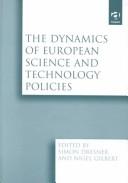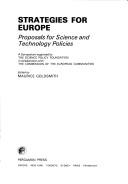| Listing 1 - 7 of 7 |
Sort by
|

ISBN: 0754613577 9780754613572 Year: 2001 Publisher: Aldershot Ashgate
Abstract | Keywords | Export | Availability | Bookmark
 Loading...
Loading...Choose an application
- Reference Manager
- EndNote
- RefWorks (Direct export to RefWorks)
Sociology of knowledge --- European Union --- Science and state --- Technology and state --- Science and state - Europe --- Technology and state - Europe
Book
ISBN: 2712700856 9782712700850 Year: 1979 Publisher: Paris : Chotard, pour la Commission des communautés européennes,
Abstract | Keywords | Export | Availability | Bookmark
 Loading...
Loading...Choose an application
- Reference Manager
- EndNote
- RefWorks (Direct export to RefWorks)
Book
ISBN: 9282893510 9789282893517 Year: 2000 Volume: *1 Publisher: Luxembourg Office for official publications of the European communities
Abstract | Keywords | Export | Availability | Bookmark
 Loading...
Loading...Choose an application
- Reference Manager
- EndNote
- RefWorks (Direct export to RefWorks)
Science and state --- Technology and state --- Research --- Politique scientifique et technique --- Recherche --- -Science and state --- -Technology and state --- -State and technology --- Technology --- Endowment of research --- Science --- Science policy --- State and science --- State, The --- Science research --- Scientific research --- Information services --- Learning and scholarship --- Methodology --- Research teams --- Government policy --- -Research --- Science and state - Europe - Congresses. --- Technology and state - Europe - Congresses. --- Research - Europe - Congresses.

ISBN: 0080229921 132246815X 1483188477 9780080229928 Year: 1978 Publisher: Oxford Pergamon
Abstract | Keywords | Export | Availability | Bookmark
 Loading...
Loading...Choose an application
- Reference Manager
- EndNote
- RefWorks (Direct export to RefWorks)
Research --- Science and state --- Technology and state --- Congresses --- -Science and state --- -Technology and state --- -State and technology --- Technology --- Endowment of research --- Science --- Science policy --- State and science --- State, The --- Science research --- Scientific research --- Information services --- Learning and scholarship --- Methodology --- Research teams --- Government policy --- -Congresses --- Research - Europe - Congresses --- Science and state - Europe - Congresses --- Technology and state - Europe - Congresses
Book
ISSN: 09442294 ISBN: 9782807605206 2807605206 Year: 2018 Volume: 101 101 Publisher: Bruxelles : P.I.E. Peter Lang,
Abstract | Keywords | Export | Availability | Bookmark
 Loading...
Loading...Choose an application
- Reference Manager
- EndNote
- RefWorks (Direct export to RefWorks)
Do the politicians actually take decisions, or rather the experts do it in their place? In other words, it is a matter of understanding whether the political stakeholders/representatives simply approve the final stage of a decision procedure led by the experts they have delegated, since they lack cognitive skills or because the experts do not try enough to explicit potentials and risks involved. Here lays the possible loss of democratic legitimacy in the decision-making process. This brings into question the responsibility of a ruling class to which the political representatives and secondarily the experts belong. This book analyses the interplay of these different actors in the political relations among States since the 1960s: this interaction capability becomes a key factor for the international accountability of a country, and above all for the democratic reliability of its decision-making process. Then we have to consider the role of the organized civil society. In that way, expertise provides the basis for the mediation among the States, and then expertise goes for the legitimacy of power practices in all parties engaged, and in the decision-making process inside the democratic arenas. -- Back cover
Experte --- Technik --- Politische Entscheidung --- Naturwissenschaften --- Expertise --- Geschichte 1960-2018 --- Europa --- Conseillers scientifiques --- Science consultants --- Décision politique --- Political science --- Actes de congrès. --- History --- Decision making --- Décision politique --- Technology and state --- Science and state --- Democracy and science. --- Technology and state - Europe. --- Science and state - Europe.
Book
ISBN: 2130470793 9782130470793 Year: 1995 Publisher: Paris PUF
Abstract | Keywords | Export | Availability | Bookmark
 Loading...
Loading...Choose an application
- Reference Manager
- EndNote
- RefWorks (Direct export to RefWorks)
Science and state --- Politique scientifique et technique --- Research --- Engineering --- Technology and state --- Government policy --- -Research --- -Science and state --- -Technology and state --- -001.89 --- State and technology --- Technology --- Endowment of research --- Science --- Science policy --- State and science --- State, The --- Science research --- Scientific research --- Information services --- Learning and scholarship --- Methodology --- Research teams --- Construction --- Industrial arts --- -Government policy --- -Engineering --- 001.89 --- Research - Government policy - Europe --- Engineering - Research - Government policy - Europe --- Science and state - Europe --- Technology and state - Europe
Book
ISBN: 9780691175843 9780691139708 0691139709 1400865840 0691175845 Year: 2015 Publisher: Princeton Princeton University Press
Abstract | Keywords | Export | Availability | Bookmark
 Loading...
Loading...Choose an application
- Reference Manager
- EndNote
- RefWorks (Direct export to RefWorks)
Between 1492 and 1914, Europeans conquered 84 percent of the globe. But why did Europe establish global dominance, when for centuries the Chinese, Japanese, Ottomans, and South Asians were far more advanced? In Why Did Europe Conquer the World?, Philip Hoffman demonstrates that conventional explanations-such as geography, epidemic disease, and the Industrial Revolution-fail to provide answers. Arguing instead for the pivotal role of economic and political history, Hoffman shows that if certain variables had been different, Europe would have been eclipsed, and another power could have become master of the world. Hoffman sheds light on the two millennia of economic, political, and historical changes that set European states on a distinctive path of development, military rivalry, and war. This resulted in astonishingly rapid growth in Europe's military sector, and produced an insurmountable lead in gunpowder technology. The consequences determined which states established colonial empires or ran the slave trade, and even which economies were the first to industrialize. Debunking traditional arguments, Why Did Europe Conquer the World? reveals the startling reasons behind Europe's historic global supremacy.
Balance of power --- Technology and state --- History --- Europe --- Foreign relations --- Military policy --- Politique militaire --- State and technology --- Endowment of research --- Power, Balance of --- Power politics --- Political realism --- Balance of power. --- Technology --- History. --- Government policy --- Council of Europe countries --- World history --- anno 1200-1799 --- anno 1800-1899 --- Equilibre des puissances --- Politique scientifique et technique --- Histoire --- Military policy. --- Relations extérieures --- Science and state --- International relations --- Eastern Hemisphere --- Eurasia --- Technology and state - Europe - History --- Europe - Foreign relations - History --- Europe - Military policy
| Listing 1 - 7 of 7 |
Sort by
|

 Search
Search Feedback
Feedback About UniCat
About UniCat  Help
Help News
News